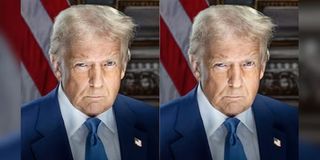Prime
What’s wrong with Donald Trump putting America first?

An official portrait of United States President Donald Trump released on January 16, 2025. PHOTO | COURTESY
What you need to know:
- What, really, is wrong with putting your nation first? Isn’t that the mandate of any elected leader? What kind of leader allows foreigners to dominate institutions, exploit resources, or overwhelm local systems while citizens suffer? Failing to prioritise the welfare of one’s people is a dereliction of duty.
On 20 January 2025, Donald Trump took the oath of office for the second time and delivered an inaugural speech strikingly different from his usual style. Gone was the bombastic Trump of campaign rallies, replaced by a measured, composed, and—above all—intelligible version. For those who have struggled to grasp Trump’s worldview, this was a rare opportunity to peer into the mind of a man whose rhetoric has often confounded his critics.
“The Golden Age of America begins right now,” Trump declared. “From this day forward, our country will flourish and be respected again all over the world. We will be the envy of every nation, and we will not allow ourselves to be taken advantage of any longer. During every single day of the Trump administration, I will very simply put America first.”
While the speech lacked the soaring eloquence of Barack Obama’s 2009 inaugural address—a hallmark of modern political oratory—it was nonetheless a defining moment. Trump’s delivery wasn’t melodious, emotional, or captivating. The teleprompter seemed to sap whatever energy he might have had as a speaker. Yet, amid this subdued performance, he offered a surprisingly coherent and memorable articulation of his vision.
Trump outlined his priorities with characteristic bluntness: strengthening border security, achieving energy independence, refocusing the military on national security, defending free speech, and rebuilding the nation using American resources. Each policy reflected a single, unyielding principle—America Comes First.
His stance on immigration was unambiguous. He declared a national emergency at the southern border and reinstated the controversial "Remain in Mexico" policy. These measures, he argued, were necessary to protect U.S. sovereignty, secure American jobs, and restore order to an immigration system he described as chaotic.
On economic matters, Trump doubled down on his nationalist agenda. He dismissed the Green New Deal as impractical and pledged to revive the American auto industry through domestic energy production. “We will drill, baby, drill,” he proclaimed, promising to end reliance on foreign oil and rebuild American manufacturing industries.
Trump’s military vision was similarly inward-focused. He vowed to end what he termed “radical political experiments” in the armed forces and redirect resources toward national security, sharply criticising international military engagements that did not directly serve America’s interests.
As we dissected Trump’s speech, a Tanzanian lawyer in our discussion group remarked, “It was a great speech, but he is continuing with the same old discrimination. The country is now in the hands of the rich Americans. Expelling undocumented immigrants. Taking back the Panama Canal.”
This comment captured a common critique of Trump’s policies: that they are inherently discriminatory and isolationist. I’ve heard similar sentiments from European diplomats who view leaders like Trump with suspicion. Yet, I find these criticisms disconnected from many voters' realities. In Western nations, the rise of nationalist and right-wing movements reflects widespread frustration with globalist policies perceived to undermine local interests. Trump’s appeal lies in his promise to reverse this trend.
What, really, is wrong with putting your nation first? Isn’t that the mandate of any elected leader? What kind of leader allows foreigners to dominate institutions, exploit resources, or overwhelm local systems while citizens suffer? Failing to prioritise the welfare of one’s people is a dereliction of duty.
Trump remains a deeply divisive figure, and I sympathise with Americans who lament the lack of better options. Yet, his message resonates with me. As a Tanzanian, I long for a leader who unapologetically champions the interests of our nation. If I were American, I might have voted for Trump—not because I like him, but because he represents a pragmatic choice in a flawed political landscape.
Critics often paint Trump as lacking a coherent worldview. Former colleagues like Mike Pence, Gen. Jim Mattis, Amb. John Bolton and Hon. Bill Barr have described him as self-serving, impulsive, and devoid of philosophical grounding. Yet, this teleprompter-guided speech suggests otherwise. If we take Trump at his word, his guiding principle as a leader is unmistakably clear: America First.
Leadership is far from a popularity contest. A president may have flaws—Trump has many—but the most fundamental responsibility of a leader is to safeguard the interests of their nation. In Trump’s case, whatever his failings, he understands the basics: it is about your people, stupid.
Perhaps this is the reason Trump’s message strikes a chord with so many. The notion of putting one’s nation first is a principle that transcends ideology. It resonates because it taps into a universal expectation of leadership: to serve and protect one’s own. Trump seems to grasp this essential truth.
As we reflect on this new era for America, we must ask ourselves: should prioritising one’s country really be so controversial? Or is it simply the duty of every leader to put the interests of the people they were elected to serve first? For me, the answer is clear. It astonishes me that it took Donald Trump to remind Americans of this fundamental principle. Perhaps this is a lesson that our nations need to learn as well.




